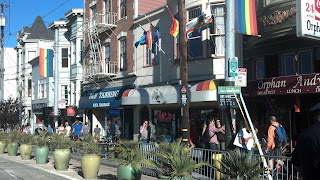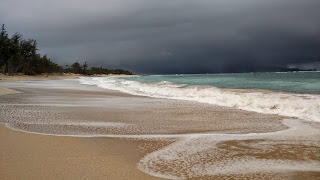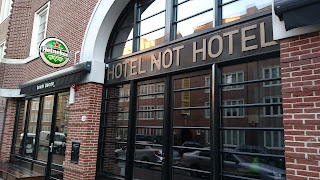The Castro Part II (The Extrovert Ideal)
Formerly known as Eureka Valley, the Castro district is one of the larger neighborhoods in the central city and increasingly one of its most well-heeled. In the 19th century, The Castro and nearby Duboce Triangle were known as Little Scandinavia before being taken over by the Irish in the 1930's. In the 1970's, the gays started moving in, most notably, Harvey Milk, a camera store owner who later went on to become the city's most famous district supervisor. The Castro has some lovely hills, homes and bougainvillea bushes as well as several clothing stores, cafes, bars and a few decent restaurants. The F Line trolley ends here, giving the neighborhood a certain 'over the rainbow' feel.
If anything, the Castro proves that this town can still throw a damn good party! Twice, recently, revelers descended on Castro Street to throw a political extravaganza; once on Wednesday evening, June 26th following the favorable Prop 8 and DOMA decisions and another on Pink Saturday block-party prelude to the Pride Parade on Saturday, June 29.
This year I'm noticeably calmer and wiser and more comfortable as those pacific breezes kiss my skin. It was only in the past month that I finally began to fall in love with San Francisco. All the on-line accounts I've read of people moving here indicate that it was love at first sight, a hot and heavy rush in which they knew in an instant. My own experience is that I was certainly charmed upon first encounter but more than a little frightened at how people carried themselves here. Denizens were outspoken and yet non-confrontational. Nice but pushy. Idealistic but cold. Extroverted but (somewhat) autistic. Throughout my time here, the city has never been short on surprises or paradoxes. There were a few times here when I returned to my apartment feeling so dejected because another social bond was aborted somehow.
So was the problem me or this city?
"Quiet: The Power of Introverts in a World 'That Can't Stop Talking" is my latest read and it describes how much of American Culture is based on the "Extrovert Ideal"; loud-talking, friendly movers-and-shakers who proudly proclaim their membership with the warrior caste. The book is ingenious for several reasons. First, the internet is alight with favorable reviews of this best-seller as Cain clearly knows her readers (for all readers are introverts so she has the most built-in audience ever!). She also introduces the audience to a few psychological gems like "reward-sensitivity" a tendency of taking great risk in the hopes of proclaiming potential rewards. "Reward-sensitivity" affects mostly extroverts and is the reason why wall street bankers did not see the coming economic apocalypse of 2008. A few introverts did speak up leading up to the crisis but their party-pooping economic warnings did not give them the promotions in the frat-style, corporate culture and so they were essentially sidelined and ignored.
Cain pegs introverts as being members of the priest/adviser caste as individuals who usually know the right answer but are too shy to speak up. According to Cain, introverts are much more honest and forthcoming than extroverts with relaying personal information on the internet (the screen and keyboard act as two buffers from a socially-hair-raising encounter). Introverts aren't antisocial; they are just ones that need to recharge by taking "me time" after a social event (like Al Gore) while an extrovert (like Bill Clinton) is planning on giving everyone a ride to the after-hours party.
With that said, San Francisco is very much an extroverted town but I feel like that extroversion, long a historical, fixed trait may be changing as the tech crowd continues to flock here with loads of money and shyer tendencies.
Other extroverted towns include New York City, Miami, LA, Sydney, Barcelona and Rio de Janiero. Introverted places abound too like Boston, Seattle, Toronto and Helsinki. "Finland is a famously introverted nation," writes Cain, "Finnish joke: How can you tell if a Finn likes you? He's staring at your shoes instead of his own." I would even venture to guess that Venice was an introverted city at least by Italian standards.
So my secret to falling in love with San Francisco? Levity. The older I get, the more I take myself less seriously and yet I'm more able to take care of business more adeptly. Everyday, I borrow just a bit of Saint Francis's extroversion and allow myself to have a good time in public. For instance, Cain also talks about Free Trait Theory which is the ability to take on a foreign trait temporarily like an extrovert who buckles down to study quietly for his LSAT (because he loves the law) or an introvert losing herself while performing ballet (because she loves to dance) . We can most easily utilize free trait theory in service of our "core personal projects"; any area of life that stokes your passion. San Francisco, it seems, is one of my core personal projects or at least a friend worth waiting for in the foyer as she takes one last lap around the house party before saying good-bye.
.










Comments
Post a Comment